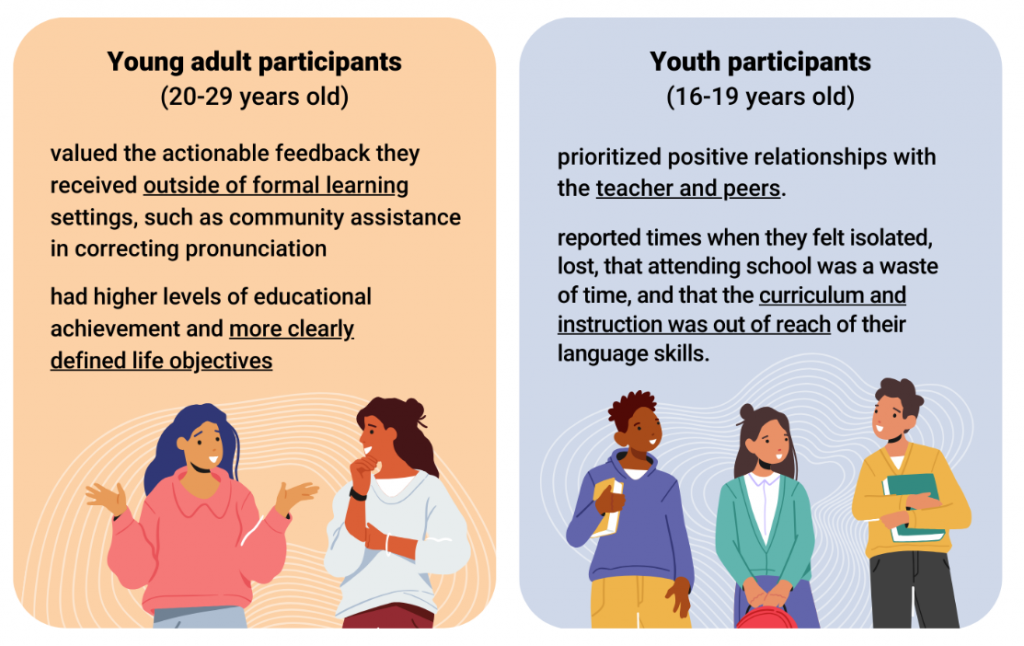Case Analysis of the Language for Young Adults Program: An Investigation into the Language, Social and Emotional Learning Needs of Refugee Youth
Researchers: Christine Doe1, Krista Ritchie1, Erin McDonald2, Carol Derby3, Olga Lyubenko3, Alicia Couto3
Affiliation: Mount Saint Vincent University (MSVU)1, Learn English Nova Scotia (LENS)2, Immigrant Services Association of Nova Scotia (ISANS)3
Research Partner: LENS and ISANS
Keywords: young adults, newcomer youth, language learning, language needs, English, social and emotional learning, Halifax Nova Scotia, qualitative methodology, case study
Summary
Overview: This study adopted a positive psychology perspective to investigate how newcomer youth and young adults navigated two educational systems in Canada: adult language learning and/ or the K-12 system.
Objective: to understand how social and emotional factors shape language learning experiences from the student perspective.
Research Justification: Refugee youth must learn English quickly to integrate and participate in academic programs. At the same time, they have learning needs related to limited or lack of literacy skills, effects of trauma, interrupted schooling, and racism and discrimination.
Infographic Excerpt

Methodology
A total of 21 newcomer youth participated in individual and focus group interviews after they had completed at least half of the summer portion of the Language for Young Adults Program, developed by ISANS and LENS. Participants were aged 16 to 29 years old and had been in Canada for 1 to 48 months; 15 had arrived as refugees, 4 as immigrants, 1 as an international student, and 1 participant was a Canadian citizen. Their home languages included Afan Oromo, Arabic, Dari, Korean, Mandarin, Persian, Serbian, Spanish, Somali, and Tigrinya.
The research team used a deductive approach to data analysis. Each theme identified in the data was further clarified by participants’ direct quotations to prioritize the voices of the study participants.
Findings
There were differences in language learning experiences between young adult (20-29) and youth (16-19) participants:
- Young adult participants exhibited higher levels of educational achievement and more clearly defined life objectives compared to the teenaged participants, who prioritized peer-group friendship.
- Young adults appreciated the actionable feedback they received outside formal learning settings, such as community assistance in correcting pronunciation. For youth, however, the rapport and relationships they established with the teacher and peers was more important than feedback.
The learning environment of the program was essential for students to establish a safe and comfortable place to learn a new language.
- Positive emotions were connected to having their learning needs met and making goals for language learning achievable.
- Participants felt confident when faced with knowledge at the right level and matched with similarly skilled peers.
- Participants found that active dialogue and conversational learning were more effective than traditional instruction. They appreciated a friendly and supportive environment, where the teacher would ask questions and correct students in a way that matched their level.
Youth participants reported times when they felt isolated, lost, or that attending school was a waste of time.
- They felt that the curriculum and instruction was out of reach based on their level of English language skills.
- They also noted that some public schools were better equipped to support newcomers' language learning needs than others.
Recommendations
- Language-learning programs should facilitate regular and meaningful interactions between learners and the wider community as it can aid in the development of their language skills by involving them in the communities they want to join.
- Newcomer students know what they need to succeed and educators and curriculum planners should engage them in the design, conduct, and evaluation of programs.
- There is a need for evidence-based instruction and for kind and knowledgeable peers and teachers to help in the language learning process.
Explore more projects


